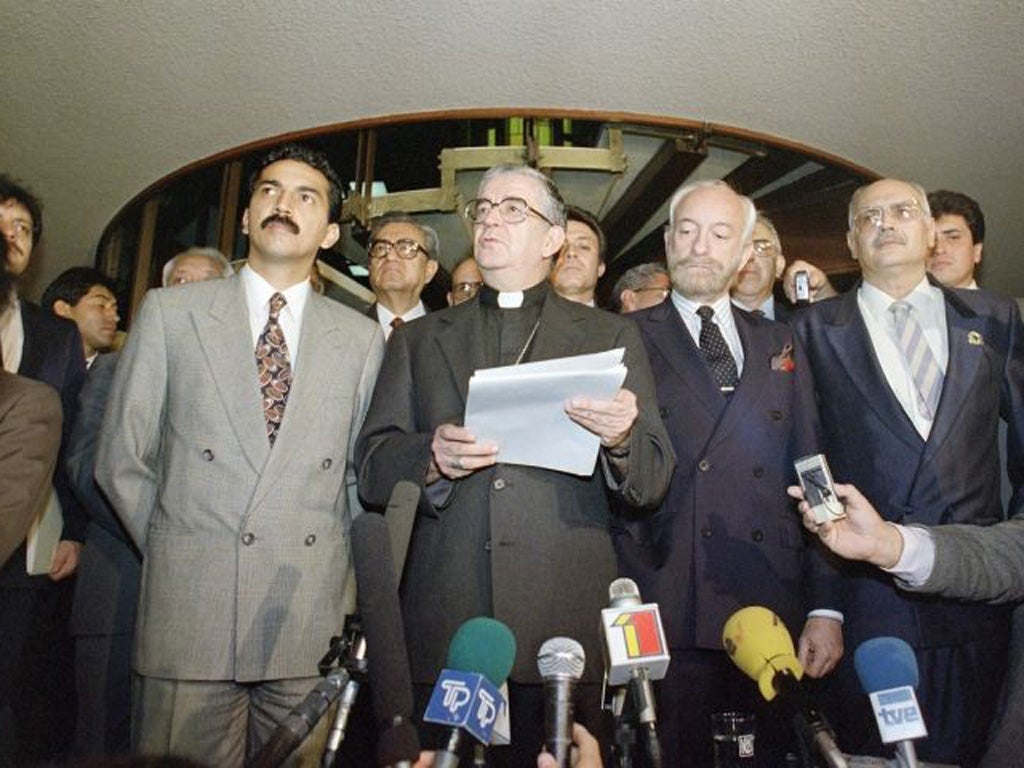
The churchmen who strove for peace amidst the tens of thousands of corpses and smoking ruins caused by what NATO and Israeli governments mendaciously called "civil wars" in Central America were all too few.
Indeed, one baleful Archbishop of Guatemala, Cardinal Mario Casariego, operated hand in glove with the oligarchy, the army and foreign troops in a shameful cataclysm in which they used bullets and bayonets to keep the impoverished majority down.
Happily, one of his modern day successors, Rodolfo Quezada Toruno, the former archbishop of Guatemala City who died in his bed last Monday, did not fit Casariego's mould. The Pope praised Quezada as "a pastor committed to the mission of evangelisation".
Born to a middle-class family in Guatemala City in 1932, Quezada was ordained as a priest in 1956 in the capital. He studied in San Salvador, Innsbruck and Rome. In 1972 he was consecrated bishop of Zacapa, eventually being named the archbishop of the capital in 2001 and cardinal two years later.
His auxiliary bishop, Juan José Gerardi, murdered in 1998, was one victim of the killings. Archbishop Oscar Romero of San Salvador, murdered in 1980 by a foreign trained marksman and whose bespectacled statue adorns the west front of Westminster Abbey, was yet another. And the six Jesuit priests of the Central American University picked off by US-trained troops in the Salvadorean capital in 1989 were certainly among the victims of the successive political bloodbaths in the Central American isthmus.
Quezada lived through times which claimed an estimated 200,000 Guatemalan lives. Most were not guerrillas but civilians from among the majority, the poorest Mayan and other aboriginal peoples, who, in the distant past before the European conquerors arrived from Spain in the 16th century, had produced a high civilisation in literature, mathematics and astronomy. More than nine out of ten of the victims in the late 20th century were found by an official investigation to have died at the hands of the police and military.
The late archbishop's priority was contained in Quezada's repeated phrase, "Justice for the poor and an end to violence in Guatemala: this sums up my whole mission". It was a standing rebuke to those who, behind Cold War structures and an overblown view of the Soviet threat in Latin America, continued to use fire and sword in defence of an indefensible status quo.
The rise of a cautious reformist government in 1945 in this deeply divided society was met by extreme hostility by the handful of families who owned and ran the country. They had the help of the US Central Intelligence Agency when reformism was abolished by a right-wing coup d'état in 1954 and a bloody counter-revolution lasting to 1996 was inaugurated.
Their leader, Carlos Arana, who was Guatemala's President from 1970 to 1974, was not bluffing when he warned the left, "If it is necessary to turn the country into a cemetery in order to pacify it, I will not hesitate to do so." He was as good as his word: the results of the slaughter are still to be seen in the hunger, illness and illiteracy of a large swathe of Guatemalans, the widespread practice of poor families selling their children, a tradition of nugatory taxes on the rich and continuing impunity to this day for those guilty of atrocities.
In a blood-soaked milieu, Quezada kept his intellect sharp, becoming rector of Guatemalan seminaries and professor of canon law in the country's universities. He kept the details of hundreds murdered by the military and was preparing to have 80 of them canonised and declared martyrs by the church.
Unlike many churchmen, he bound Christianity and justice together. He declared, "Only when we have more Christians, not only with religious cultural roots, but with a truly personal faith, who can discover their vocation to holiness and in their personal lives, will we have a humane and just society."
He played a major role in the UN peace process, which got under way once Washington and its Israeli allies, who sold arms and training to the Guatemalan forces, saw that the support they were giving was serving merely to undermine their already wobbly prestige in the region. From 1987 to 1993, Quezada was chairman of the National Reconciliation Commission, which sought peace among the warring forces and foreign promoters of terrorism after 36 years of strife. Under the Oslo Agreements of 1990 worked out with the UN he was appointed "conciliator in the peace process" of Guatemala. He retired in 2010.
Rodolfo Quezada Toruño, priest: born Guatemala City 8 March 1932; died Guatemala City 4 June 2012.
Join our commenting forum
Join thought-provoking conversations, follow other Independent readers and see their replies
Comments